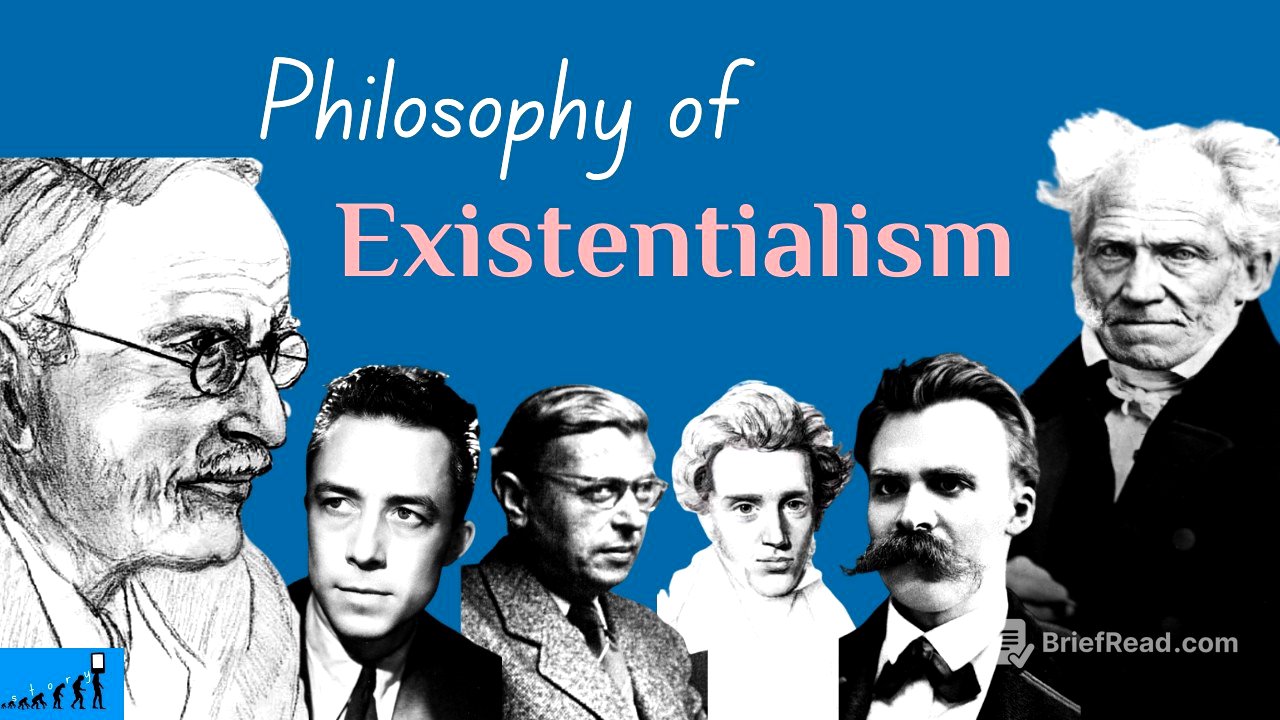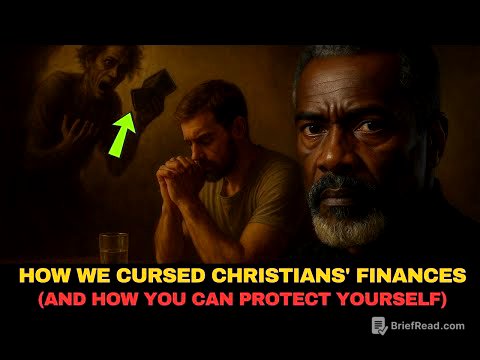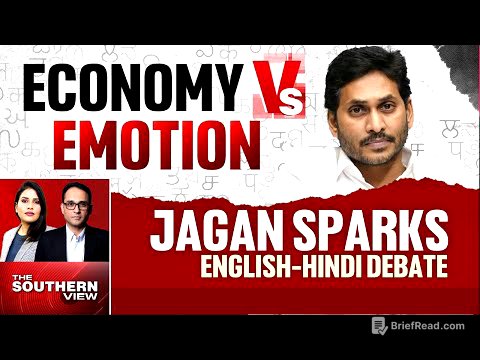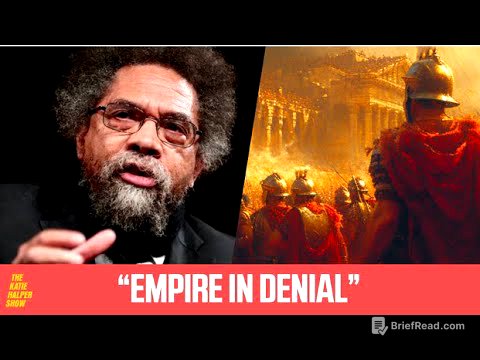TLDR;
This video explores philosophical answers to the meaning of life from a secular perspective, examining the ideas of Schopenhauer, Kierkegaard, Nietzsche, Jung, Sartre, and Camus. It covers concepts like the will to life, the death of God, the unconscious, existential freedom, and the acceptance of the absurd. The video concludes that while science has weakened religious beliefs, existentialism offers a way to find meaning in a godless world, emphasising personal responsibility, creativity, and the acceptance of life's inherent struggles.
- Schopenhauer: Life is driven by a blind will, causing suffering.
- Kierkegaard: Meaning requires God, freedom leads to anxiety.
- Nietzsche: God is dead; meaning comes from the will to power and artistic creation.
- Jung: Collective unconscious and archetypes shape our understanding.
- Sartre: Existence precedes essence; we define our own meaning.
- Camus: Life is absurd; find joy in the struggle.
Schopenhauer: The World as Will and Representation [1:05]
Schopenhauer rejects both God and rationality as motivators for human action, instead proposing nature as the driving force. He argues that a mysterious, unified will, bestowed by the universe, compels all living beings and objects. This will is largely beyond our control, with our rational minds merely scratching the surface. Schopenhauer's philosophy, outlined in "The World as Will and Representation," responds to Kant's distinction between phenomena (our experience) and numina (the unknowable world in itself). Schopenhauer posits that there is no distinction between phenomena and numina; they are two sides of the same coin, which is the will. We only perceive its representation.
The Will to Life: Love and Pessimism [9:40]
Schopenhauer explains the will through the example of love, which he sees as a surface-level representation of the biological urge to procreate. The will to life is a passion shared by all living beings, with each individual acting as its eye. He argues that rational thought would deter people from sex due to its consequences, but the will is so strong that it overrides reason. Schopenhauer's pessimistic view is reflected in Marcel Proust's depiction of love as a disappointing experience. The will is like a gigantic iceberg, with human consciousness only being the tip.
Suffering and the Negation of the Self [12:31]
Schopenhauer suggests that we are caught between the irrational will and our rational desire for order, leading to suffering. We are not free when it comes to this will, as it will destroy us to achieve its goals through someone else. Drawing inspiration from Buddhism, Schopenhauer proposes the negation of the self as a solution to suffering. By becoming one with the universe, we recognise that there is no individual self, only a universal will. Compassion is the recognition of this blind will, differing from conventional morality.
Art as a Release from the Will [16:49]
Schopenhauer suggests that the only way to cope with suffering is through intellect and art, which allow us to move to a state of non-existence, similar to Buddhist nirvana. Experiencing artistic beauty liberates us from the blind will, allowing us to become pure, willless, and timeless subjects of cognition. Music, for Schopenhauer, represents the purest artistic form because it is timeless, universal, and fosters compassion.
Schopenhauer vs Hegel: Pessimism vs Optimism [18:41]
Schopenhauer contrasts his philosophy with Hegel's, who believed in progressive historical processes. Schopenhauer argues that time is merely a surface-level veil, beneath which lies chaos ruled by the blind will. While Hegel saw history as a progression towards betterment, Schopenhauer believed that historical progress is an illusion and that human desires remain insatiable. Schopenhauer's pessimism suggests that suffering is constant, regardless of societal progress.
The Pessimistic Outlook in Modern Society [22:54]
Schopenhauer's pessimism, while seemingly negative, can be beneficial in modern society by lowering expectations and bringing us back to the reality of life's irrationality and suffering. Understanding the blind will allows us to manage our expectations and become more content with life's harsh realities. Schopenhauer believed that we are driven by a blind will to continue life, making us tools in the hands of nature and evolution.
Kierkegaard: The Father of Existentialism [25:54]
Kierkegaard is considered the first existentialist philosopher, challenging Kant and Hegel by focusing on the individual's role in defining their life's purpose. In "Either/Or," Kierkegaard explores the choice between living for pleasure (the aesthetic life) and living ethically (the moral life). He uses literary devices to present the aesthetic lifestyle, while the moral lifestyle is conveyed through letters discussing social responsibility and love within marriage.
The Aesthetic vs. The Ethical Life [28:10]
Kierkegaard contrasts the pursuit of pleasure with the commitment and discipline required for an ethical life. He notes that an aesthetic lifestyle, focused on indulgence, can lead to emptiness and boredom, while an ethical life requires long-term commitment and responsibility. Kierkegaard, conflicted about marriage, suggests that the ethical choice might be not to marry at all if one cannot commit to monogamy.
Anxiety, Comparison, and the Role of Faith [32:01]
Kierkegaard identifies comparison and wishing as sources of anxiety in modern life. He argues that comparing ourselves to others and wishing for something creates expectations that often lead to disappointment. While he acknowledges the challenges of both aesthetic and moral lifestyles, Kierkegaard offers religious faith as an alternative, allowing for self-reflection and a unique understanding of the world.
Individuality and Freedom of Choice [33:56]
Kierkegaard emphasises the importance of finding a personal answer to life's existential questions, rather than relying on external authorities. He sees the choice between a pleasure-seeking and a moral life as a fundamental aspect of human existence. Growing up in a harsh Nordic climate, Kierkegaard valued long-term thinking and commitment, distinguishing an ethical person from one focused on immediate gratification.
Fear and Trembling: Freedom and Responsibility [39:55]
In "Fear and Trembling," Kierkegaard explores how anxiety stems from our freedom of choice. He argues that each individual perceives reality differently, and that our choices define our unique selves. Using the example of Abraham's dilemma, Kierkegaard highlights the paradoxical nature of freedom, which comes with responsibility and consequences.
Paradoxes and the Role of Faith [43:29]
Kierkegaard discusses the paradox between moral transparency and natural concealment, noting that nature often involves deception for survival. He argues that tough decisions are hard to explain through rationality and can only be understood through faith. Faith, for Kierkegaard, involves a resignation or deferring authority to God, similar to love, which throws reason out the window.
The Solution to Modern Despair [47:19]
Kierkegaard's solution to modern despair and anxiety is deeply personal, requiring each individual to find a unique path to fulfillment. He emphasises that we alone are responsible for finding meaning in our own lives, and that becoming a single individual is essential.
Nietzsche: Thus Spoke Zarathustra and the Death of God [48:01]
Nietzsche's "Thus Spoke Zarathustra" responds to the death of God by offering art as a means to liberate us from nihilism. He introduces the concepts of eternal recurrence, will to power, and the Übermensch (overman). Nietzsche seeks to replace God with human artists, whom he calls Übermenschen, who can transcend themselves.
The Problem with Rationality [52:02]
Nietzsche argues that rationality, as a replacement for God, can lead to authoritarianism and utilitarianism, which he sees as detrimental to human excellence. He criticises rationality for producing conformity and suppressing artistic creativity. For Nietzsche, rationality is merely a tool, not an end in itself, and needs something else to give humans purpose.
Art as a Solution to Nihilism [55:16]
Nietzsche offers art as a solution to the death of God and nihilism, arguing that it can counterbalance rationality and provide humans with a genuine purpose in life. He explains how art can replace God and keep humanity from going mad.
Zarathustra: From Prophet to Antithesis [56:06]
Nietzsche transforms Zarathustra, the founder of monotheism, into his own antithesis, rejecting the single god idea and the notions of good and evil. Instead, Zarathustra believes that God is dead and is being replaced by the Übermensch, who is capable of creating his own values. Zarathustra spends 10 years in a mountain cave to gain wisdom, reflecting Nietzsche's belief in the value of solitude.
Will to Power: Growth and Expansion [1:02:01]
Nietzsche's will to power is not merely a will to live or survive, but a drive to grow and expand. It is about making the most of one's life, thriving despite pain and suffering, and achieving greatness in any field. Nietzsche argues that all living beings instinctively want to dominate others, but this power can be channelled creatively to promote human greatness.
Eternal Recurrence: The Cyclical Nature of Existence [1:05:03]
Nietzsche teaches Zarathustra the doctrine of eternal recurrence, which posits that everything is repeated forever due to the finite amount of matter and infinite time in the universe. This means that the good, the bad, and the terrible are endlessly repeated. Zarathustra eventually accepts this depressing thought, understanding that one must remain awake eternally.
The Journey of the Übermensch [1:07:01]
Nietzsche describes the Übermensch as a rope between apes and the Übermensch, something that shall be overcome. To become an Übermensch, one must go through three stages: the camel (carrying burdens and learning discipline), the lion (saying no to social norms and traditions), and the child (symbolising creativity and innocence). This childish creativity allows the Übermensch to create new values and sacrifice himself for others.
Nature and the Übermensch [1:10:58]
Nietzsche uses elements of nature, such as the sun and the seas, to symbolise the ideal metaphor for becoming the Übermensch. The Übermensch is not created by God, but is from nature and is nature itself. He must be ready to burn himself in his own flame to rise anew. The Übermensch is an unselfish man, just like the sun, who gives away light.
The Übermensch as Artist [1:13:47]
Nietzsche's Übermensch is an artist who perfects his craft, breaks free from traditions, and creates new values. He rejects the soul, pity, meekness, and the divine, instead celebrating life, the body, and confronting danger. Nietzsche sees artists like Marcel Proust, Franz Kafka, and Charles Bukowski as examples of Übermenschen who dedicated their lives to creating art.
Jordan Peterson's Criticism of Nietzsche [1:20:23]
Jordan Peterson criticises Nietzsche's Übermensch, arguing that Jung's psychoanalytical works expose holes in Nietzsche's philosophy. Peterson suggests that human values are not created but discovered. Nietzsche's philosophy promotes a natural freedom, letting nature take its own course without religious or moral punishment.
Conclusion: Art as a Solution to Nihilism [1:25:03]
Nietzsche offers art as a solution to the nihilistic tendencies of modernity, arguing that rationality alone cannot give our lives meaning. Rationality combined with human passion can provide a deeper meaning and purpose. Great artists symbolise Nietzsche's Übermenschen, dedicating their lives to the pursuit of art that benefits and inspires others.
Jung: Collective Unconscious and Storytelling [1:26:07]
Humans are distinct from other animals due to their ability to tell stories, a capacity shaped by our ancestors and sewn into our DNA. Carl Jung discovered that humans from different cultures share similar myths and stories, indicating a shared hidden software: the collective unconscious.
Collective Unconscious: Universal Cultural Memories [1:28:00]
Jung's collective unconscious refers to collective memories passed down from early human evolution, unique to humans. These universal cultural memories include myths and characters that we easily resonate with, such as the hero or villain. Jung used dreams as evidence of the collective unconscious, seeing them as windows into our past collective memories.
Archetypes: Templates for Understanding Life [1:33:45]
Jung called symbols and myths present in all cultures archetypes, molded inside us prior to birth. These archetypes are repeated characters in religions, mythologies, art, and literature, serving as templates for understanding our experiences. Jung characterised the human psyche into the ego, the personal unconscious, and the collective unconscious, where archetypes are stored.
Psychological Types: Introvert vs. Extrovert [1:38:36]
Jung's psychological types of extrovert and introvert refer to personality traits and openness among individuals. He uses the Greek gods Apollo (reason) and Dionysus (passion) to represent these types. Apollo symbolises introversion, while Dionysus symbolises extroversion.
Persona vs. Shadow: The Public Self and Hidden Traits [1:40:13]
Jung presents the idea of the persona, a mask or personality we display to the world, guided by archetypes and personal memories. The persona is a role we play on stage in society, while the shadow represents our weaknesses, shortcomings, and suppressed urges that we hide from others.
The True Self and Individuation [1:43:47]
Jung argues that our life's ultimate goal is to realise the true self, achieved through individuation, a process of reconciling the conscious with the unconscious. This involves balancing the persona with the shadow, recognising and accepting both. Two important archetypes are anima (feminine in men) and animus (masculine in women), helping us understand the opposite sex.
Sartre: Nausea and the Meaninglessness of Existence [1:46:57]
Sartre offers a new answer to the meaning of life, stating that there is no God and that this godless world is an opportunity to create meaning for ourselves. He replaces religion with existentialism, arguing that we have no essence prior to our existence and that it is our responsibility to make our own essence. In "Nausea," Sartre tells the story of a man who experiences nausea due to the meaninglessness of existence.
The Discovery of Existence Preceding Essence [1:53:38]
Sartre's protagonist discovers that objects do not project meaning for themselves; their meaning only exists inside the observer's consciousness. Therefore, it is up to us to create meaning for ourselves. This leads to the revolutionary concept that existence precedes essence.
Subjectivity, Objectivity, and Freedom [2:02:57]
Sartre argues that humans are not solid beings but are constantly becoming and changing. He sees the outside world as an anchor that we use to keep ourselves afloat and stable. This instability of being is freedom to make whatever you like to be, but also destruction as it causes anxiety.
Being and Nothingness: The Basis of Existence [2:04:37]
In "Being and Nothingness," Sartre starts with nothingness as the basis of existence and then moves on to how we fill this void with societal roles or fake identities. He rejects psychoanalysis, arguing that we are what we know, and anything we are not conscious of is not us.
Nothingness and Bad Faith [2:08:31]
Sartre explains that we exist as nothing, which makes us totally free to float around. However, this nothing being has to deal with the external world, which curtails our freedom. To escape these constraints, we escape into our imagination or rely on someone else for guidance. Bad faith means living a false existence or self-deception, negating existence as a thing for itself.
Consciousness and Responsibility [2:17:58]
Sartre argues that our consciousness makes us who we are, and anything we are not conscious of is not us. He rejects the psychoanalytical theory of the unconscious, stating that it removes responsibility from individuals. Sartre's philosophy operates totally on a conscious level, giving the human rational faculty too much credit.
Existentialism: Freedom and Responsibility [2:20:24]
Sartre's existentialism liberates us from God, tradition, and societal norms, but this freedom comes with responsibility. He argues that we are born without an essence and that it is our job to create our own essence. Sartre's philosophy is a little too optimistic when it comes to creating our own identity, as biology also plays a role.
Camus: The Absurdity of Life and the Will to Joy [2:34:33]
Camus argues that life is absurd, meaningless, and contradictory, yet we grow to love it. He offers an alternative to both religion and nihilism, suggesting that we should accept the absurdity of life and find joy in the struggle itself.
A Happy Death: Reversing Natural and Conscious Death [2:36:34]
In "A Happy Death," Camus explores the quest for happiness and the irony of finding it when close to death. He reverses natural death with conscious death, suggesting that we seek happiness but don't know how to be happy.
The Stranger: Guilt and the Human Condition [2:38:38]
In "The Stranger," Camus explores the themes of death and guilt. The protagonist, Meursault, is indifferent to his mother's death and commits murder, leading to his execution. Camus raises the question of whether it is more important to cry at a funeral or to be guilty of murder.
The Plague: Individual vs. Collective [2:47:02]
In "The Plague," Camus looks at the relationship between the individual and the collective during a plague epidemic. He shows that we are not static human beings, but human becoming, and that we cannot be happy when we see others bleed.
The Fall: The Guilt of Inaction [2:50:26]
In "The Fall," Camus explores the theme of guilt through a fallen judge who is haunted by his inaction in saving a woman from suicide. Camus suggests that to be human in modern times is to be guilty, not only for what we do but also for what we do not do.
The Myth of Sisyphus: Accepting the Absurd [2:54:13]
In "The Myth of Sisyphus," Camus introduces his philosophy of absurdism, arguing that we should accept the absurdity of life and find joy in the struggle itself. He concludes that the struggle itself is enough to fill a man's heart and that one must imagine Sisyphus happy.
The Rebel: Reconciling Marx and Nietzsche [2:56:47]
In "The Rebel," Camus tries to bridge the gap between Marx and Nietzsche, reconciling the pursuit of justice with the celebration of individual freedom. He argues that the true rebel is not the person who conforms to revolutionary ideology but the person who can say no to injustice.
Conclusion: The Meaning of Life and the Joy of Work [3:02:03]
The philosophy of existentialism came about because science weakened religious belief among intellectuals. Camus argues that there is no meaning in life and that we should be content that it has no meaning. He found his purpose in writing, inspiring others, and pushing boundaries of human intellect.









